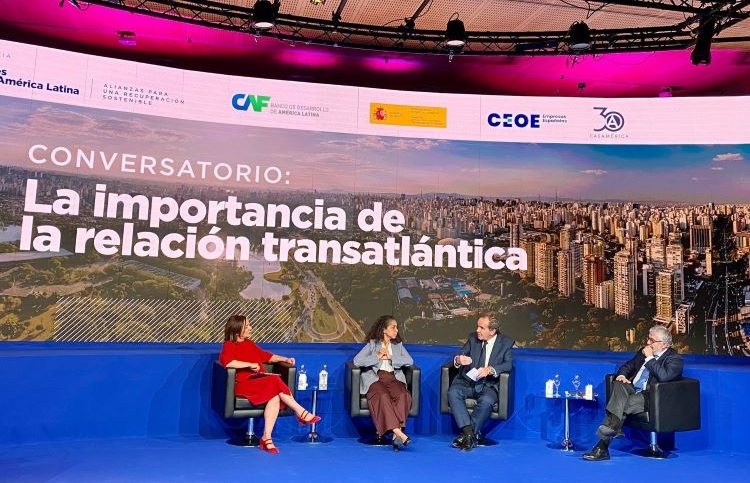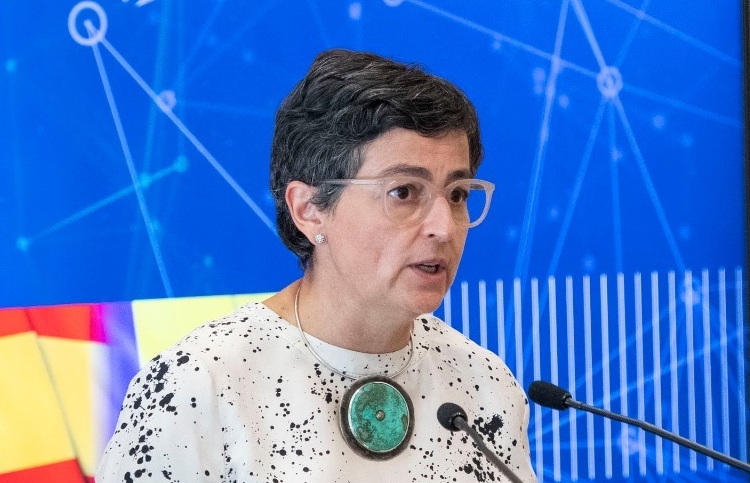Eduardo González
The geostrategic and economic imbalances generated by Russia’s invasion of Ukraine represent an opportunity to reconfigure Europe’s relations with Latin America, a subcontinent that not only shares many of the Western values, but also has the economic resources that the EU will need most as a result of the conflict.
These are some of the main conclusions of the CAF Europe-Latin America Conference. Alliances for a sustainable recovery, organized yesterday by CAF-Development Bank of Latin America and CEOE at the Casa de America headquarters in Madrid and which brought together leading experts and opinion leaders from different sectors to reflect on the state of the transatlantic relationship and address future opportunities and challenges.
“This continent offers solutions and answers to the current crises,” said CAF’s executive president, Sergio Díaz-Granados, during the presentation of the meeting. “Today there are precisely 400 days until the inauguration of the Spanish Presidency of the EU in the second half of 2023, and that is the propitious space to reconvene the EU-Latin America summit of heads of state and government, which has not been held since 2015 and which has CAF’s enthusiasm to help convene it,” he added.
The event began with a discussion, entitled The importance of the transatlantic relationship and moderated by the director of the newspaper El País, Pepa Bueno, in the course of which the US ambassador to Spain, Julissa Reynoso, stated that the situation in Ukraine “has created an important reason for the US and EU to move forward on energy synergies and, most obviously, on defense cooperation.”
The war, she continued, has had “an impact on energy and food prices all over the world, not only in the poorest countries”, and, therefore, Europe, Latin America and the US form “the natural triangle to be able to react in an organized way” to this crisis. This response has to be “short term and long term, because the war may end tomorrow, but its consequences may last for a long time, as long as Putin remains in Russia“, she warned.
JJ Ruiz: “The West will not win against tyranny without allies, and that ally is Latin America”
For his part, the Ibero-American Secretary General (SEGIB), former Chilean Foreign Minister Andrés Allamand, warned that, although it is “difficult to predict events” arising from the war, “whatever the configuration” of the future international order, “transatlantic relations are going to be very important in that configuration.” “The fact that we are talking about a transatlantic relationship with three actors, Europe, the US and Latin America, is supremely important,” but “the challenge is how these three actors are going to interact in the face of adversity,” he continued. “We are on the threshold of a strategic convergence between Europe and Latin America, as should also be the case between the US and Latin America,” and, therefore, “we must seize the opportunity that arises from this situation of adversity” to increase synergies, he said.
An example of this need, according to Allamand, is that “Europe needs what Latin America has and Latin America needs what Europe can provide”. “What does Europe need: energy, food and raw materials. Latin America has an abundance of these three elements: its energy potential is infinitely greater, its food production has enormous potential and, as for minerals, digital transformation is not possible without lithium and copper,” he explained.
According to the secretary general, Latin America’s relations with Europe and the US are “objectively below their potential” because “the possible synergies between the regions have not been seen.” “Latin America and Europe are a third of the UN; imagine a third of the UN acting in a coordinated manner” in the response to Russia, warned Allamand, who recalled, in this regard, that in the UN resolution on the Russian invasion, 18 Latin American countries voted in favor and there were only four abstentions. “There is also political coincidence between Latin America and Europe in terms of values”, a coincidence that already existed but that “the war has made evident”, he added.
At the same meeting, the president of the Elcano Royal Institute, José Juan Ruiz, stressed that, with the war in Ukraine, “Europe has suddenly discovered that it is not only a regulatory power, but that it plays a role in global geostrategy, which has been a surprise in a Europe that was self-absorbed.”
“There is one challenge that both Europe and the US have championed: world order,” but “not everyone shares their decisions” on Russia, he warned. “Countries representing 51% of world GDP and 70% of the world’s population did not approve of sanctions at the UN,” and that situation shows that “the West is not going to win the war on tyranny without allies,” he declared. “Europe, the US and the G7 cannot exclusively impose sanctions, they have to have a proposal for a positive reconstruction of the world order, and that is where Latin America emerges as a solution to these problems and as an ally”, because “without Latin America we cannot create a broad coalition of countries to impose values and that international vision”, he stated.







